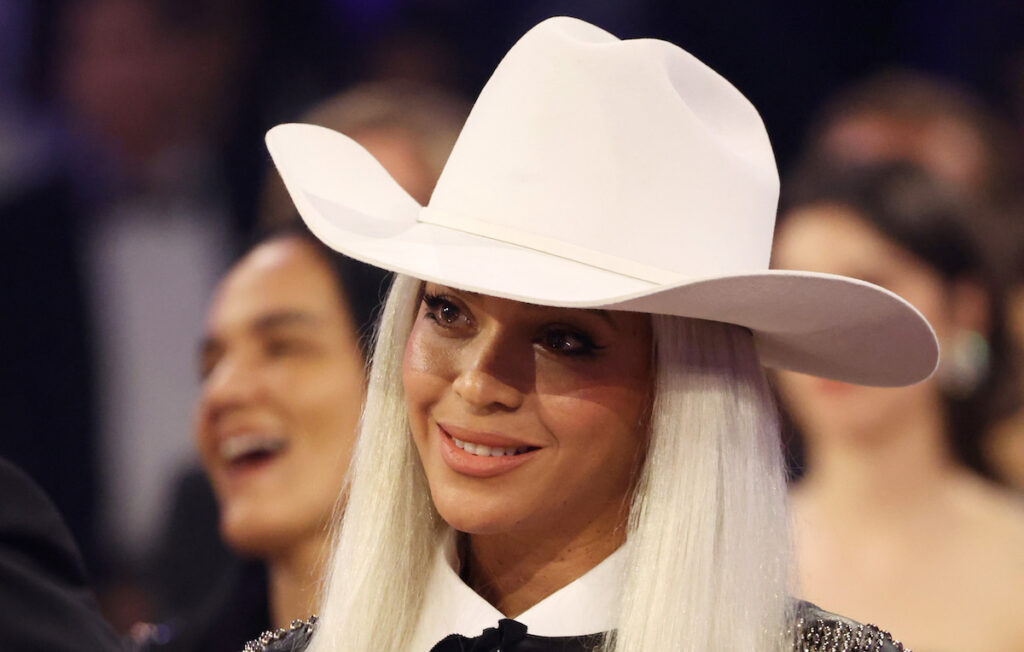Country songs get played on country radio—that seems like a simple enough rule to follow. But after Beyoncé released two new country songs on Feb. 11, “Texas Hold ‘Em” and “16 Carriages,” a fan of the singer found that his request to hear the music on country radio was denied. This set off major backlash—which eventually got the Oklahoma radio station to play “Texas Hold ‘Em” and to release a statement in response to the fan’s claim that it was “blatant racism” that stopped the station from playing Beyoncé’s new music.
RELATED: Critics Are Calling for Beyoncé to Be Canceled After Controversial Live Performance.
On Feb. 13, Justin McGowan posted on X (formerly Twitter), “I requested Texas Hold ‘Em at my local country radio station (KYKC) and after requesting, i received an email from the radio station stating ‘We do not play Beyoncé on KYKC as we are a country music station.'”
McGowan included a screenshot of the email in his post and tagged a Beyoncé fan account that has over 450,000 followers.
In another tweet, McGowan added, “This station needs to be held accountable for their blatant racism and discrimination against Beyoncé.” He also asked that fans email the radio station to request the song.
Fox News reported the following day that the station had responded to the outcry. Station manager Roger Harris explained in a statement that KYKC “didn’t know about the song,” and once they found out, they tried to get access to it.
“Finally we got our hands on it, and based on the fan support, we decided to air it,” Harris said. “Truthfully, normally we would … wait a while to see how the song performs on the charts and on bigger country stations than ours, as we are just the little guys.”
Harris also spoke to The New York Times, and said that he had “never experienced anything in my career like the amount of communications that we received in support of the song.”
He continued, “We haven’t played her on our country station because she’s not a country artist. Well, now I guess she wants to be, and we’re all for it.”
As the NYT article notes, the situation reignites a conversation about Black artists being excluded from country music. It’s a conversation that Beyoncé herself has been involved in before. The singer included a country song, “Daddy Lessons,” on her 2016 album Lemonade. The AP reported that the song was rejected by the Recording Academy’s country music committee, which meant it was not eligible in country categories at the Grammy Awards.
As the AP explained, country artists including The Chicks, Blake Shelton, and Dierks Bentley showed their support for the song.
RELATED: Fans Call Blake Shelton an “Embarrassment to Country Music” After Controversial Performance.
Following the backlash against KYKC, those in charge of other country music stations have spoken out about including Beyoncé’s new songs on their playlists. Entertainment Weekly spoke to a few program managers, who shared their thoughts.
Travis Moon from 93Q in Houston, Texas, said of “Texas Hold ‘Em,” “We’re playing right now. We’re actually the first station in America to officially add the song … I added the song because it’s a great song, and I’m excited because it just sounds so freaking good on the radio.”
Mike Levine from Los Angeles’ Go Country 105 said, “The new single sounds great. We will probably be able to play it like one or two times this week just to sample it, but I won’t know until about a month or so, once we start looking at programming again, just to see how the data is on it, and if it’s something we add to our regular programming or not.”
Regardless of how Beyoncé’s new music does on country radio, it seems clear now that her upcoming album, Renaissance Act II (out March 29) will be country-themed. The first Renaissance album, released in 2022, was an homage to dance and house music.
There is also expected to be a third album, since Beyoncé previously said that it was a “three-act project.” As the NYT reports, music critics believe the entire trilogy will be about reclaiming the Black history of certain musical genres.

